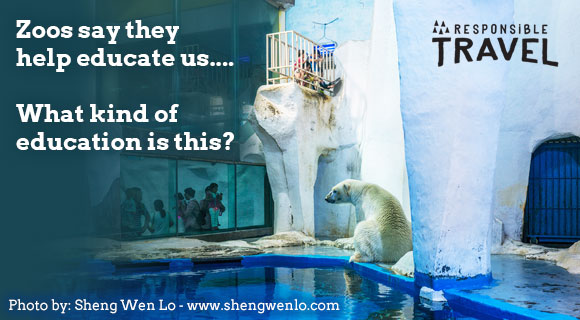Why we do not support zoos
Supported by Joanna Lumley and the Born Free Foundation

Responsible Travel and our clients have always felt strongly about wildlife and wildlife conservation.
Primarily we enable people to see animals in the wild in ways that support conservation of habitats and species. We believe that ensuring local communities benefit economically from wildlife tourism is an integral part of that. Our wildlife vacation sales continue to grow year on year.
In 2017 we decided to rethink promoting vacations which visited zoos on our site and we began a period of research with support from our friends at the Born Free Foundation.
Our feeling had always been that animals should not be held in captivity unless there are very good reasons to do so and the findings of the research we undertook - summarised below - backed this up.
Keeping wildlife captive is not a humane thing to do, and there is evidence that some species develop unnatural behaviours as a result of stress that are not seen in the wild as a result of frustration or stress. This includes repetitive pacing and circling, or head bobbing and swaying in species such as elephants and bears1.
Zoos have frequently argued that keeping animals in captivity is justified for the following reasons, each of which we examined.
1. Education. Zoos argue that by educating people about animals we help conserve them.
Our view: We have two objections to this argument. First, there are many ways to educate people about wildlife in the wild (some outstanding natural history programs and educational materials) that do not require them to be held in captivity.
Second, there is no evidence that seeing animals in zoos does make people become active in conservation2.
2. Zoos fund conservation programs. Many zoos now claim to be 'conservation organisations.'
Our view: Our view is that this is overstated as a justification. The World Association of Zoos and Aquariums (WAZA) encourages its members to commit just 3 percent of their expenditure to conservation3.
While a few zoos fund some good conservation work, it is hard to understand how they can justify claims to be conservation organisations when such minimal funds are committed.
In our opinion, most zoos are simply commercial organisations that display animals for profit and donate a tiny proportion of expenditure to conservation.
3. They breed endangered species, either to protect the gene pool or for reintroduction.
Our view: As 90 percent of animals kept in zoos are not endangered4, there is no justification for keeping them in captivity to protect the species.
There are very few examples of successful reintroduction programs of endangered species from zoos. In our opinion, there are better ways to go about these initiatives than through zoos.
Our conclusion
Our conclusion is that zoos are not appropriate in this age. They are relics of the past, and the arguments to justify keeping animals in captivity no longer stand up.
In our view, rather than being conservation organisations, zoos keep animals in captivity for our entertainment and this is not acceptable.
What did we do as a result?
We removed any tours that include visits to zoos from the Responsible Travel site.
With the support of the Born Free Foundation we conducted further analysis and investigation into a range of other captive animal facilities including rescue centers and rehabilitation centers. We are still promoting legitimate animal sanctuaries and rescue centers for animals that cannot be returned to the wild; wildlife conservancies and parks; and rehabilitation centers where animals are looked after and then returned to the wild. However, no captive breeding should take place in these facilities. We will also continue to promote genuine endangered species conservation centers.
Our stand has also been supported by keen animal welfare activist, actress Joanna Lumley. She says:
We hope that other travel businesses and tour operators will join us in creating a movement for change that recognises that zoos are outdated, unethical and unnecessary today.
References:
1. Born Free Foundation: Zoochosis: Abnormal and stereotypic behaviour in captive animals
2. BBC Horizon: Should We Close Our Zoos? 17 April 2016 and Captive Animals Protection Society: Zoos neither educate nor empower children
3. World Association of Zoos and Aquariums: Conservation strategy (pp 33), also quoted in The Guardian: Zoos could become 'conservation powerhouses'
4. BBC Horizon: Should We Close Our Zoos? 17 April 2016 and Born Free Foundation's The EU Zoo Inquiry (2012), pp32 & 33.
Main photo used with permission from Sheng Wen Lo, shengwenlo.com

Responsible Travel and our clients have always felt strongly about wildlife and wildlife conservation.
Primarily we enable people to see animals in the wild in ways that support conservation of habitats and species. We believe that ensuring local communities benefit economically from wildlife tourism is an integral part of that. Our wildlife vacation sales continue to grow year on year.
In 2017 we decided to rethink promoting vacations which visited zoos on our site and we began a period of research with support from our friends at the Born Free Foundation.
Our feeling had always been that animals should not be held in captivity unless there are very good reasons to do so and the findings of the research we undertook - summarised below - backed this up.
Keeping wildlife captive is not a humane thing to do, and there is evidence that some species develop unnatural behaviours as a result of stress that are not seen in the wild as a result of frustration or stress. This includes repetitive pacing and circling, or head bobbing and swaying in species such as elephants and bears1.
Zoos have frequently argued that keeping animals in captivity is justified for the following reasons, each of which we examined.
1. Education. Zoos argue that by educating people about animals we help conserve them.
Our view: We have two objections to this argument. First, there are many ways to educate people about wildlife in the wild (some outstanding natural history programs and educational materials) that do not require them to be held in captivity.
Second, there is no evidence that seeing animals in zoos does make people become active in conservation2.
2. Zoos fund conservation programs. Many zoos now claim to be 'conservation organisations.'
Our view: Our view is that this is overstated as a justification. The World Association of Zoos and Aquariums (WAZA) encourages its members to commit just 3 percent of their expenditure to conservation3.
While a few zoos fund some good conservation work, it is hard to understand how they can justify claims to be conservation organisations when such minimal funds are committed.
In our opinion, most zoos are simply commercial organisations that display animals for profit and donate a tiny proportion of expenditure to conservation.
3. They breed endangered species, either to protect the gene pool or for reintroduction.
Our view: As 90 percent of animals kept in zoos are not endangered4, there is no justification for keeping them in captivity to protect the species.
There are very few examples of successful reintroduction programs of endangered species from zoos. In our opinion, there are better ways to go about these initiatives than through zoos.
Our conclusion
Our conclusion is that zoos are not appropriate in this age. They are relics of the past, and the arguments to justify keeping animals in captivity no longer stand up.
In our view, rather than being conservation organisations, zoos keep animals in captivity for our entertainment and this is not acceptable.
What did we do as a result?
We removed any tours that include visits to zoos from the Responsible Travel site.
With the support of the Born Free Foundation we conducted further analysis and investigation into a range of other captive animal facilities including rescue centers and rehabilitation centers. We are still promoting legitimate animal sanctuaries and rescue centers for animals that cannot be returned to the wild; wildlife conservancies and parks; and rehabilitation centers where animals are looked after and then returned to the wild. However, no captive breeding should take place in these facilities. We will also continue to promote genuine endangered species conservation centers.
Our stand has also been supported by keen animal welfare activist, actress Joanna Lumley. She says:
"It only takes one to create a movement for change and it is fabulous to see a travel company being brave, sticking their heads above the parapet and saying that in 2017 keeping animals in captivity purely for our entertainment is just not acceptable.
There are so many superb ways to learn about and appreciate animals in the wild; we should be encouraging people to get out into nature, not watching wildlife behind bars. I hope that more companies will follow this excellent example".
There are so many superb ways to learn about and appreciate animals in the wild; we should be encouraging people to get out into nature, not watching wildlife behind bars. I hope that more companies will follow this excellent example".
We hope that other travel businesses and tour operators will join us in creating a movement for change that recognises that zoos are outdated, unethical and unnecessary today.
References:
1. Born Free Foundation: Zoochosis: Abnormal and stereotypic behaviour in captive animals
2. BBC Horizon: Should We Close Our Zoos? 17 April 2016 and Captive Animals Protection Society: Zoos neither educate nor empower children
3. World Association of Zoos and Aquariums: Conservation strategy (pp 33), also quoted in The Guardian: Zoos could become 'conservation powerhouses'
4. BBC Horizon: Should We Close Our Zoos? 17 April 2016 and Born Free Foundation's The EU Zoo Inquiry (2012), pp32 & 33.
Main photo used with permission from Sheng Wen Lo, shengwenlo.com




